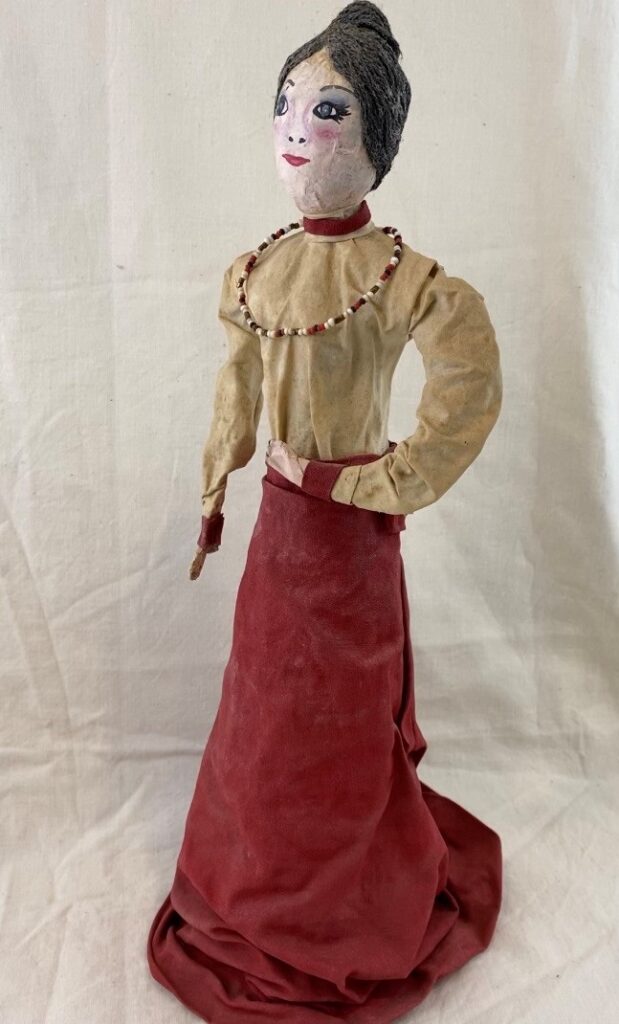by Brian Boake

The fact that Labour Day was a day off from work was one of the many strange things about our society I didn’t understand growing up. In my 14th summer, it truly was a day of labour, as we needed to clean out Granny’s house. Mom and I were stuck with it. We knew the task was pending, and had prepared ourselves. Granny’s sticks of furniture were of little value; not so her artwork, so we spent hours displacing and packing paintings, statuary, and those fussy mobiles she loved to create.
Dad was in charge of cataloging, but couldn’t resist wheeling himself around, offering gratuitous advice. We told him to stick to his knitting. Grumbling, he re-positioned at the table, where I set his brakes.
Finally, we got to Gran’s tiny bedroom, and began to clear her chest of drawers. Granny had asked us to donate everything still wearable to a woman’s shelter, to avoid post-mortem disputes with my aunts. I tossed what few garments there were into a garbage bag. When I got to the bottom shelf, I was greatly surprised, and called to Mom.
“Why is the oldest thing in her house tucked away?”
When Mom entered, I carefully held up this papier-mache relic. Mom’s reaction was immediate, and frightening.
“Why are you crying?”
She smiled through her tears, which in a way was even more disconcerting. Eventually she choked out, “That doll is why we’re in Canada.”
I was speechless. She took my hand, and sat me down on the bed, then joined me.
“I didn’t know what the right time was going to be to tell you about your grandmother. But events seem to have decided for us.”
“Mom, I don’t know what you’re talking about. Granny was wonderful to me, so you better be careful.”
“Do you remember how determined she was to go to Expo 67 with us?”
What an absurd question.
“Of course I do. That was only two months ago. She said she wanted to see all the new stuff, and dragged us around to the geodesic dome and Habitat on our first day.”
Mom nodded. “Mother had been fascinated by Buckminster Fuller for decades. She was terribly ill, but the thought of going to Expo kept her alive.”
That wasn’t news. Everything we packed was 20th century; no antiques for Gran.
Mom took the doll from me, and as if reading my mind said: “Teenagers aren’t known for patience, but you will have to be. Let’s go to the dining room. I’m only telling this story once, and I want your father to hear.”
Dad set aside his notes at Mom’s insistence. He glanced at the doll without interest.
After we sat, Mom looked carefully at Dad, then at me. “Do either of you know what a suffragette is?”
I suppose our blank faces provided the non-responses she expected.
“The suffragettes were women who campaigned to gain the vote in Britain prior to the Great War. Granny was one.”
I was already restive. Mom could sense it, and gave me back measure for measure. “Last chance. Either shut up and let me tell the story, or I’m leaving this table and you’ll never know.”
Blackmail! “All right, go on.”
“Granny told me she made the doll when she was ten out of scraps from one of her mother’s ball gowns. She said her father was quite taken with it, and placed it in their living room. When she turned eighteen, she asked for tickets to a performance of ‘A Doll’s House’. Her parents knew nothing of the play, and assumed from the title it was safe. But Mom, who was already a secret rebel, was aware of the uproar the work had caused in Copenhagen, and was determined to see it for herself. She asked her best friend to go with her. Her name was Christabel Pankhurst.”
Dad seemed startled. “Pankhurst?”
Mom held up her hand as a slight smile crossed her face. “Ah, the kraken wakes. We’ll get there. In honour of the playwright, I want the windows open.”
Dad and I were mystified, but I complied.
“My mother…sorry, Granny…told me afterwards she could barely contain her excitement, but needed to in order to provide a bland response to her parents about how she liked the play.”
Dad piped up. “What was so exciting about this play?”
“It was probably the first woman’s liberation[1] play ever performed in Victorian England, even though it was written by a Norwegian man. The heroine discovered her husband was a hypocrite, despite his respectable trappings.”
My turn for a question: “What did the heroine do about it?”
Mom hesitated: “At the end, she left her husband and children.”
After a loud silence, Dad spoke: “That would be radical today.”
Mom took a long time to respond. “Indeed…I need to explain who Christabel’s mother was.”
I suspect Dad was past guessing where this conversation was going – I know I was. We sat and waited for the next surprise.
Mother continued: “At that time, women couldn’t vote in any country in the British empire. A movement began in order to change the law to legalize women’s suffrage, and those involved were called suffragettes. Christabel’s mother Emmeline became the movement’s leader.”
Dad broke in. “No surprise her daughter went to a radical work of theatre.”
Mom nodded. “After several years of peaceful efforts to change the law, many of which Granny and Christabel participated in, the leaders became increasingly frustrated. Some were radicalized, and starting advocating violence.” A deep intake of breath, then “Christabel was one of them.”
“And she wanted Granny involved?” I blurted.
Another nod, this one tiny.
I felt nauseous. My grandmother a violent person…? “Mom, she was the gentlest person ever. Are you sure about this?”
“She told me herself, when I wasn’t much older than you.”
“Did the suffragettes carry out their threats?”
“They sure did. Letter bombs to politicians, chemicals poured into mailboxes, fires…a suffragette took a horsewhip to a man she thought was David Lloyd George[2]. Granny was horrified. She told the Pankhursts that women were losing the moral high ground, and she wasn’t going to commit violence.”
Dad was intrigued. “I bet the Pankhursts didn’t like that.”
Mom’s face was grave. “Christabel told Mom she had to choose, and if she didn’t go along, she would be betrayed to the police.”
“Some friend!” I was furious.
“Mom fled for Canada that night. She took what little money she had, packed up one suitcase, threw in her doll as her only momento, and went to the docks. She found a freighter bound for Montreal. They were short a cook, and she took the job.”
Dad again. “What if it had been going to Australia?”
“Then I guess we’d know all about koalas and kangaroos. It was just a fluke.”
My turn. “What about her parents? They must have been frantic.”
“Granny wrote to them when she landed. They may have been secretly relieved at her departure. She had become an object of despair to them. They had been arranging assignations for her with suitable young men, all of whom bored her silly. In those days, if a woman wasn’t married and popping out babies by her early twenties, she was doomed in the eyes of respectable society.”
“Anyway, you know the rest. She moved to Toronto for work, and took night classes, where she met my father. They opened their studio in King City, and photographed probably half the marriages in the Township before they retired when Dad got sick.”
A shimmering memory returned to me. “This all makes sense! I remember how happy Granny was when Dr. King won the Nobel Peace Prize[3]. It was like she had won it. I couldn’t fully understand why, and now I do.”
Mommy smiled. “Go on.”
“He vindicated her belief in non-violence. The world caught up to her through Dr. King.”
Dad reached over awkwardly to give me a one-armed hug. “That’s my smart girl becoming a woman.”
I was greatly pleased, but not satisfied. “Why did you ask us to open the windows as a tribute to the playwright?”
“In one of Ibsen’s earlier plays, a female character is asked what she will do in the society she is joining. She replies “I will let in fresh air, Pastor.” And there’s more.”
“Let’s have it.”
“The name of the heroine in ‘A doll’s house’ is named Nora.”
I jumped up. “That’s my name!”
“Mom never demanded anything of me, other than a forceful request my first-born daughter should receive that name.”
She stood me up and gathered me in her arms.
“And so she did.”
[1] My story is set in 1967. “Women’s liberation” was a much more common term than “feminism”.
[2] https://en.wikipedia.org/wiki/Suffragette_bombing_and_arson_campaign
